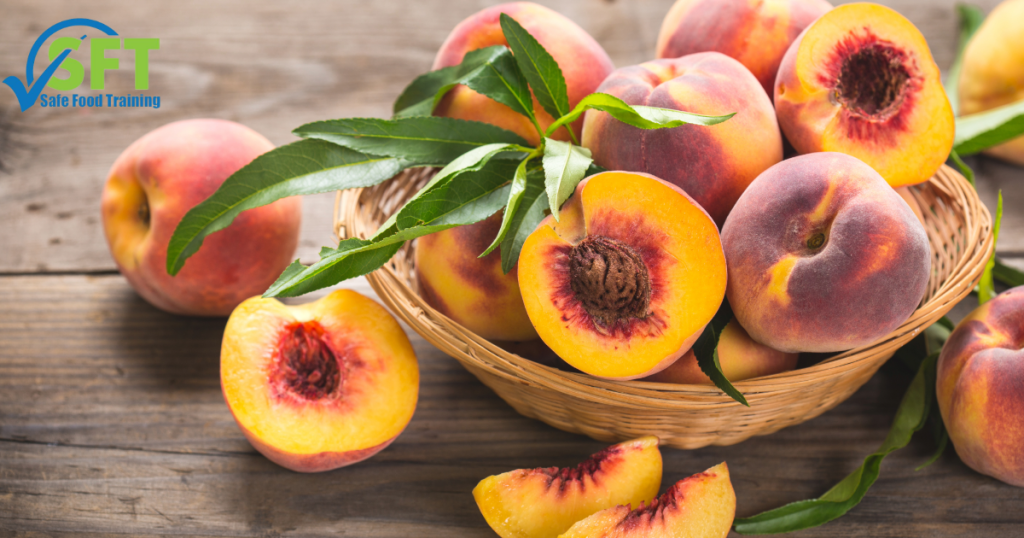
As a Minnesota food safety professional, my usual focus is on in-house standards like time/temperature and hygiene. However, the recent nationwide peach recalls—initially fresh peaches from HMC Farms and Moonlight Companies due to Listeria, followed by Kroger’s “Private Selection” peach salsa recall—demonstrate the critical need for a Certified Food Protection Manager (CFPM) to manage external threats. The salsa recall was necessary because it was made with the contaminated peaches, illustrating the “continuing fallout” and the vital lessons in traceability and supplier-level risk for all Minnesota food managers.
1. The Initial Recall: A Problem at the Source
The first recall was for the raw, agricultural product—the fresh peaches. Listeria is a bacterium found in soil, water, and animal feces, meaning contamination can happen right on the farm or in the processing plant.
This presents an immediate challenge for you, whether you are a manager, chef, or business owner.
- You cannot see the threat: Listeria doesn’t change the smell, taste, or appearance of the food. A contaminated peach looks just like a safe peach. This is why we rely on food safety systems, not our senses.
- The supplier is your first line of defense: This incident underscores the importance of using approved, reputable suppliers. Even the best suppliers can experience a recall; they must have procedures to identify and notify you immediately.
Receiving is a critical control point: Your receiving dock is more than a doorway. It’s the first checkpoint in your kitchen’s safety plan. You must train your team to check for undamaged packaging, proper temperatures (when applicable), and to know who your suppliers are.
2. The "Recall Fallout" and Your Certified Food Protection Manager Training
The secondary recall of the peach salsa is, in many ways, the more important lesson for a Certified Food Protection Manager. The salsa company didn’t necessarily do anything wrong in its own kitchen, but a contaminated ingredient it received from a supplier affected it.
Ask yourself these questions:
- Do you have a traceability plan? If you received a recall notice today for “HMC Farms Peaches,” could you—within minutes—know if you had that product? Could you check whether you used that product in a batch of house-made chutney, a dessert special, or a salad?
- Are you tracking lot codes? For many managers, the box is broken down and the invoice filed away. Best practice during a high-risk event is to maintain traceability. This can mean having a simple log or even just clipping the lot code label from a case and attaching it to your invoice.
How Fast Can You Act? A recall is a race against the clock. Your role as a CFPM is to have a plan before you need it. This includes identifying the product, segregating it (labeling it “DO NOT USE”), and communicating with staff and, if necessary, the public and your local health department.
3. The Pathogen: Why Listeria is a Unique Threat
This recall involved Listeria, not E. coli or Salmonella. For a food professional, this distinction is critical, as Listeria has a terrifying “superpower.”
- It Grows in the Cold: This is the most important fact. Unlike most bacteria that are slowed by refrigeration, Listeria monocytogenes can continue to grow and multiply at refrigerated temperatures (40°F or below).
- The Risk in Ready-to-Eat (RTE) Foods: A manager might mistakenly believe a product is “safe” once it’s in the walk-in cooler. With Listeria, that cooler can become an incubator. This makes it uniquely dangerous for ready-to-eat foods that lack a “kill step” (i.e., cooking), such as fresh salsa, deli meats, soft cheeses, and sprouts.
- It is a zero-tolerance pathogen: Because Listeria is so dangerous, especially to high-risk populations, there is a “zero-tolerance” policy for it in ready-to-eat foods. A single cell is all it takes to render a food “adulterated.” This is why you see massive recalls from a potential contamination, not just a confirmed one.
These events are clear reminders that food safety isn’t just a poster on the wall; it’s an active, daily-managed system. And you lead that system.
Build Your Expertise with Safe Food Training



Recalls are real-world tests of your food safety systems. As a Certified Food Protection Manager, you lead the effort to protect public health and your business’s reputation.
If you or your team need the 8-hour food licensing certification or your three-year renewal, we offer friendly, personalized, and effective training tailored for Minnesota food professionals.
Don’t wait for a recall. Visit safefoodtraining.com to register and gain the skills to handle any food safety challenge.


